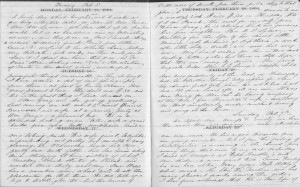 Hedwiga Regina Shober Gray diary, entries for 5-7 February 1864. R. Stanton Avery Special Collections
Hedwiga Regina Shober Gray diary, entries for 5-7 February 1864. R. Stanton Avery Special Collections
One of the most attractive characters in the Gray diary is Mrs. Gray’s youngest son, Morris Gray (1856–1931), later a Boston lawyer and president of the Museum of Fine Arts.[1] His mixture of childish wit and occasional obstreperousness fascinates his mother:
Boston, Wednesday, 1 February 1860: I must begin to teach Morris his letters ─ he is nearly 4 years old ─ and a queer little mortal too.
While playing house under a tent of his own construction the other day he suddenly broke out, “Mamma, I mean to make a big tent for God when I am [a] big man.”
“A tent for God, dear, what makes you think God would like a tent?”
“Oh because he will want to get in it, out of the rain, up there in the sky; don’t you ‘member, you told me God did not have any house up there? He [is a] kind God to us and I will help him make [a] tent.”
It happened to be raining hard in this nether sphere of ours, and I suppose Morris thought ‘up there in the sky’ was a forlorn kind of place at best.
Boston, Thursday, 1 March 1860: What busy little brains children have. Morris was quite distressed to hear that he could not take his shoes & stockings with him to Heaven – but concluded the rest of his wardrobe must find its way there somehow, for “of course God would not want to see him ‘bare-skin.’”
Boston, Wednesday, 7 March 1860: Morris’s birthday – bless the darling! Four years old – a big baby-boy whom I mean to keep a baby as long as he will let me; a picture child, with his lily white skin and rose cheeks, brightest blue eyes and long loose curls of wavy golden hair. And yet a most tempestuous child at times, though he looks a little seraph.
Philadelphia, Saturday, 28 April 1860: Sam & Annie [Shober][2] came round last evg. Children went over there after breakfast to see their “baby cousin.”[3] He is really a noble little fellow, with splendid dark eyes. Took the children & Fanny [Gray][4] to see Aunt Regina [Shober][5] this morning. Morris would not go near her at first. I think her dress the like of which his eyes never beheld before repelled him – he was not exactly frightened, but he evidently thought her a rather portentous apparition.
There are many other references to Morris (or Mossie) in the diary, but one from 1862 features another instance of Mrs. Gray’s way with a story:
Boston, Thursday, 10 April 1862: In order to teach him the commandments in the least burdensome way I read them to him once every evg. before beginning his bible story. And he reads them in the morning to me, while I am dressing. He knows them now but he cannot bear to pass a word unexplained; accordingly the 7th comm[andment] has been a great stumbling block. I had to tell him it was a terrible sin – that he could not possibly be made to understand now – no little child could – but when he should grow older, and understand its meaning, he must remember that his mamma begged him never to be tempted into committing that sin.
“Yes, I’ll remember,” said he, and I don’t doubt he will. But for several successive readings, he would ponder it, with such an unsatisfied expression, such an unrest on his little mind, and wind up with, “Still, I do wish I could know, what that adultery means!”
Notes
[1] The Morris Gray Lecture Fund at Harvard is named in his honor. All excerpts from the Hedwiga Regina Shober Gray diary, R. Stanton Avery Special Collections.
[2] Mrs. Gray’s younger brother Samuel Lieberkuhn Shober (1828–1902) married Ann Bond Cochran in 1858.
[3] The Shobers’ first child, John Bedford Shober, born in August 1859.
[4] The diarist’s niece, Frances Loring Gray (1843–1919), who married William Adams Walker Stewart in 1874.
[5] Mrs. Gray’s aunt and namesake, Hedwiga Regina Shober (1786–1865).
Share this:
About Scott C. Steward
Scott C. Steward has been NEHGS’ Editor-in-Chief since 2013. He is the author, co-author, or editor of genealogies of the Ayer, Le Roy, Lowell, Saltonstall, Thorndike, and Winthrop families. His articles have appeared in The New England Historical and Genealogical Register, NEXUS, New England Ancestors, American Ancestors, and The Pennsylvania Genealogical Magazine, and he has written book reviews for the Register, The New York Genealogical and Biographical Record, and the National Genealogical Society Quarterly.View all posts by Scott C. Steward →